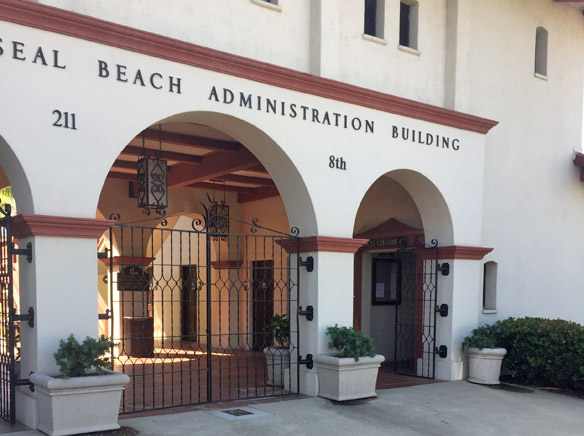The City Council this week approved a contract for consulting and negotiation services with HF&H Consultants, LLC, to help the city renegotiate its “solid waste” (trash) contract with Republic Services.
The agreement with HF&H could cost the city up to $78,000—$65,000 for anticipated services and another $13,000 as a contingency to cover unexpected work, according to a staff report prepared by Assistant City Manager Patrick Gallegos.
This was an item on the Consent Calendar. The council votes on Consent Calendar items collectively, without public discussion unless a council member pulls an item from the calendar to be considered individually. The council didn’t remove any items from the April 8 Consent Calendar.
Seal Beach resident Seth Eaker said he supported the item during the public comment segment of the council meeting. Eaker said he had worked with Republic Services and said Republic had been a consistent presence at community events. He called Republic Services a partner in the community.
Gallegos’ report described the city’s current “solid waste franchise agreement” (trash collection contract) as “antiquated.” “In fact, the agreement has not been modified in 22 years,” Gallegos wrote.
His report said that “there have been at least four major pieces of legislation that have dramatically changed the operations and obligations of processing solid waste.”
According to Gallegos, in 1989, Assembly Bill 939 mandated California cities to reduce their contributions to trash landfills by 25% by 1993 and by 50% by 2000.
According to Gallegos, in 2012, Assembly Bill 341 required businesses and residences with at least five units to begin recycling programs.
According to Gallegos, in 2014, Assembly Bill 1826 required local governments to set up organic waste recycling programs for businesses.
According to California’s Department of Resources Recycling and Recovery’s website, “Organic waste as defined in the law includes the following material: food waste, green waste, landscape and pruning waste, nonhazardous wood waste, and food-soiled paper waste that is mixed in with food waste.”
According to Gallegos, in 2016, California Senate Bill 1383 set a statewide goal of reducing the volume of organic trash going into landfills by at least 20% (preferably 75%) by 2025.
His report said city officials are still working on meeting the requirements of the organic waste recycling legislation.
As the Sun reported in 2018, CalRecycle could fine Seal Beach $10,000 for not complying with the law.
“At the City Council meeting on January 22, 2018, staff recommended that the Council adopt the proposed AB 1826 rates which amounted to $366,515 per year. Council considered the new rates to be detrimental to the local business community since they would bear the cost and continued the item for further research and delivery of alternatives,” Gallegos wrote in the April 8 staff report.
Actually, the council did not vote on the organic waste rates in 2018. Then-Councilwoman Ellery Deaton expressed particular exasperation with unfunded mandates from the state government.
“Consequently, staff resumed discussions with Republic Services to develop alternative proposals and pricing,” Gallegos wrote in the April 8 staff report.
A January 2019 CalRecycle staff report said nine cities were not incompliance.
Gallegos told the Sun this week that it was probably more than nine cities. Gallegos also pointed out that one of the challenges facing recycling in the United States is that China is no longer accepting recyclable materials that are not considered clean.
Gallegos said the city had a letter from CalRecycle accepting Seal Beach’s plan to comply with the organic recycling mandate. “So, I think we’re headed in the right direction.”
Gallegos later phoned the Sun to say that the CalRecycle report was accurate at that time.
The Jan. 15, 2019, CalRecycle report specifically named the cities of Seal Beach, Ceres, Cudahy, Grand Terrace, Irwindale, La Puente, McFarland, Paramount, and Signal Hill.
In any event, CalRecycle apparently approved a Seal Beach plan to address the compliance issue.
The CalRecycle report, which approved on Jan. 15, said “Tbe City will adopt a food waste recycling collection program through its franchise hauler, including rates for service, by its July 22, 2019, Council meeting. The collection program will be implemented within 30 days of the approval date.”
The CalRecycle report will go on to say, “In the interim, the City’s franchise hauler will continue providing education and outreach to covered businesses regarding commercial organics services available, including green waste collection, wood recycling, and food recovery opportunities.”
Meanwhile, according to Gallegos’ April 8 report to the City Council, CalRecycle has given Seal Beach until the end of this year to implement an organic waste recycling program for businesses.
According to the Gallegos report, city staff learned from CalRecycle staff that California cities were only passing on the costs of organic recycling programs to businesses. The report went on to say that imposing costs on only those businesses that create organic waste would result in a 300% increase for those businesses.
“If the rates were applied across all commercial businesses (as opposed to only a direct user fee) the rates would increase by 18.25%. Staff also continued negotiating with Republic Services on the price of the AB 1826 program. Through negotiations, City staff was able to reduce this cost by more than $56,000,” the report said.
All of which brings the story back to the council’s decision to approve a contract with HF&H Consultants, LLC, to help the Seal Beach renegotiate its trash contract with Republic Services.
According to Gallegos’ report, in July 2018, HF&H helped Seal Beach staff compare the city’s current trash contract with other city contracts. In the report, Gallegos wrote that Seal Beach staff recommends renegotiating the city’s current contract and that the staff recommended hiring HF&H to develop and negotiate a new agreement with Republic Services.
There was no new business on the Monday, April 8, agenda and no public hearings scheduled.
David N. Young contributed to this article.





